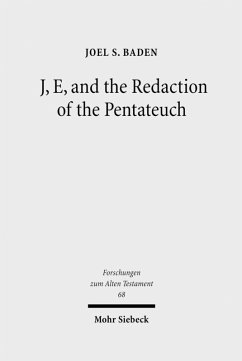Joel S. Baden addresses the relationship between the J and E documents in the Pentateuch. He demonstrates that, contrary to the standard claims of classical source criticism, the J and E sources were never combined into a 'JE' document. Rather, these two sources were combined with each other at the same time that they were combined with the P and D documents, in one process of redaction. After investigating the history of scholarly arguments regarding the existence and combination of J and E, the author goes on to argue in detail for the dependence of D on the separate, independent narratives of J and, primarily, E. Significant attention is paid to the issue of redaction. In particular, Baden critiques the manner in which passages have traditionally been attributed to redactors, and argues for a more restrictive concept of the redactor and his work. It is further argued that the literary evidence in the Pentateuch provides for the existence of only a single redactor, to whom the compilation of all four sources of the Pentateuch is to be attributed. In the course of this study, a number of important questions regarding the composition of the Pentateuch are addressed: the existence of E, the relationship between D and the narratives of Genesis-Numbers, and the nature of the redactor. In the end, this study stands as both a critique of traditional documentary analysis of the Pentateuch and a defense of its fundamental claims. Born 1977; 2002 M.A. in Northwest Semitics from the University of Chicago; 2007 PhD in Hebrew Bible from Harvard University; currently Assistant Professor of Old Testament at the Yale Divinity School.
Dieser Download kann aus rechtlichen Gründen nur mit Rechnungsadresse in A, B, BG, CY, CZ, D, DK, EW, E, FIN, F, GR, HR, H, IRL, I, LT, L, LR, M, NL, PL, P, R, S, SLO, SK ausgeliefert werden.


